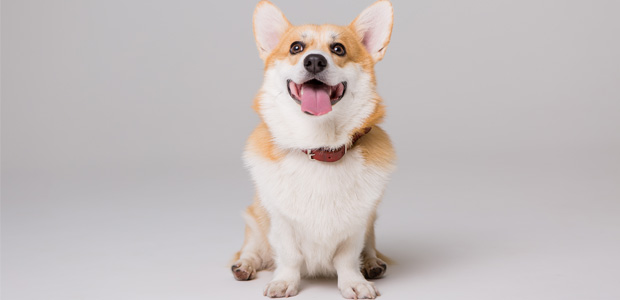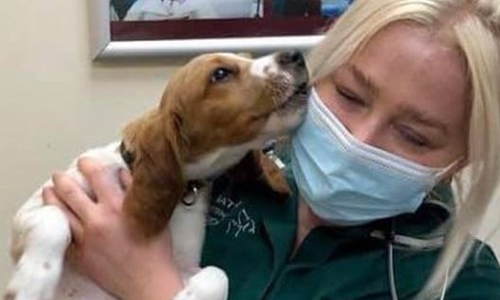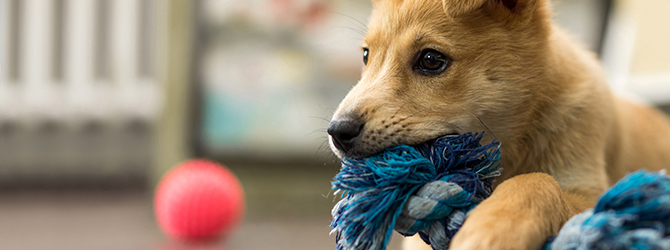Puppy vaccinations: answering your questions
First Published: 23/07/2020
Last Updated: 25/04/2024
You’ve recently brought home your new puppy and naturally have a few questions about the vaccinations they’ll need.
Vaccinating your puppy is a fundamental aspect of keeping them safe and healthy.
Let’s take a look at some of the most-searched ‘puppy vaccinations’ queries on the web.
Do puppies need vaccines?
Yes! While there’s debate around this in the media, any qualified veterinary professional will tell you that puppies absolutely need to be vaccinated. They should be given an initial course of vaccines, and then booster injections throughout their life to ensure they stay protected.
Vaccinations are effective at keeping puppies and adult dogs protected against a range of infectious diseases, some of which — like leptospirosis and infectious canine hepatitis — can be fatal.
When do puppies need vaccines?
Young puppies need their first course of vaccinations when they’re 6 - 8 weeks old. Known as a ‘primary course’, this procedure will consist of 2-3 injections (of the same brand of vaccine) and they’ll be administered 2 — four weeks apart.
Most puppies bred by a responsible breeder will have had their first set of vaccinations before you bring them home. Your breeder will be able to advise further.
Read more: Finding a good puppy breeder: things to consider when buying a dog.
When do puppies get their second injection?
The second set of vaccines, included within your puppy’s ‘primary course’, will be administered 2-4 weeks after the first set.
Your puppy may get their second set of vaccines at 8 - 12 weeks of age, providing they had their initial vaccinations at 6 - 8 weeks.
How much do puppy vaccinations cost?
This will depend on the vet practice you attend. There’s no fixed price for puppy vaccinations.
We recommend our Pet Health Club. You can keep your dog fully vaccinated against parvovirus, leptospirosis, canine distemper, hepatitis and kennel cough, all year every year.
This includes your puppy’s primary vaccine course, their monthly flea treatment and worm treatment, plus regular health checks with your vet and much more.
Locate your nearest Pet Health Club practice today!

Can you administer puppy vaccinations at home?
In most cases, you’ll need to bring your puppy to the vets. That way, they’ll be safe and you can rest assured the vaccine is being administered by a trained professional.
In some cases, your vet may visit you to administer your puppy’s vaccine at home. If you have any queries, don’t hesitate to contact your local vet. They’ll be more than happy to advise further.
When is it safe for my puppy to go outside? Do I need to wait until after their primary vaccine course?
Ideally, yes. You should only take your puppy out for walks once they’re fully vaccinated and your vet has given you the go-ahead.
Of course, before they’ve been vaccinated, you can still let them out into the garden to do their business and maybe carry your puppy out into the street to greet friends or relatives.
The important thing is not to let your puppy come into contact with other pets or where other dogs have been until they’re fully protected, this will help eliminate the risk of viral disease.
Puppy survives parvovirus after vaccination scam

Stephanie Wilkins, from Bath, bought a cocker spaniel puppy, Cooper, who fell seriously ill with parvovirus due to fake vaccination papers from the seller.
Despite a grim outlook, Cooper survived after intensive treatment at Bath Vet Group.
The rise in parvovirus cases shows the importance of proper vaccinations. Stephanie is urging pet owners to ensure all vaccinations are verified and to seek vet help if their puppy seems unwell. Her experience also highlights the risks from unscrupulous puppy breeders.
Read more: 7 puppy essentials: what do you need for a new puppy?
Can unvaccinated puppies be around vaccinated dogs?
If you have another dog at home and they’re up to date with all their booster vaccinations, then it’s fine for them to socialise with your new puppy.
When it comes to taking your puppy out on walks, there’s no way of knowing whether the new dogs you encounter are fully up to date with their vaccines.
It’s best to avoid walking your new puppy in public until their full primary vaccine course has been administered.
How often do puppies need injections?
Your puppy will need booster vaccinations every year. Once they’ve had their primary vaccine course, your vet will advise you to book your puppy in for their first booster vaccination in 1 years’ time.
Not all conditions need to be vaccinated against every single year. For example, the parvovirus booster is only needed every three years. That said, conditions like leptospirosis need to be vaccinated against annually.
Don’t be alarmed — your vet will keep you up to date, all you need to do is attend your appointments.

How old does a puppy have to be to get a rabies vaccine?
Rabies does not currently occur in the UK, so your puppy will only need a rabies vaccination if you plan to take them abroad or if you’re buying them from another country.
Your puppy must have been microchipped before they can receive a rabies vaccination. Most rabies vaccinations won’t be administered when your puppy is younger than 12 weeks old.
Read more: Animal health certificates: what you need to know before taking your pet abroad
How long is a dog's rabies vaccine good for?
If you live in the UK with your dog/puppy, they’ll only need to be vaccinated against rabies if you’re taking them abroad. If this is the case, your pet will need their rabies vaccine at least 21 days before you return home.
In countries where rabies is still a threat, the rabies vaccination is classed as one of the core vaccines. This means it’s given as part of the primary vaccine course and yearly boosters.
How long does the parvo vaccine last?
Your puppy will be vaccinated against parvovirus as part of their primary vaccine course, which begins at 6 - 8 weeks of age and finishes 2 - 4 weeks later.
They’ll then get a parvo booster 12 months later (aged one year). From this point onwards, your dog will need a Parvo booster every three years.
If your breed is susceptible or if there’s a high incidence of parvovirus in your area, your vet may recommend an extra injection when your puppy is aged 16 weeks.
Read more: Dog vaccinations: keeping your puppy happy and healthy.
When can my puppy go in the garden?
If your garden is secure and safely closed off from other dogs, your puppy can go outside straight away. Introducing your puppy to the garden is a great way to build up your pups confidence and familiarize them with their new environment. Taking them outside is also a great way to start their toilet training.
When can I take my puppy for a walk?
It’s always best to ask your vet and take their advice, but generally speaking, you will be able to take your puppy out for a walk two weeks after their second jab.
Unvaccinated puppies are susceptible to picking up viruses and infectious diseases, such as parvo and distemper, because they will spend lots of time sniffing and licking as they explore their surroundings.
When you have waited for the amount of time that your vet has advised, your fully vaccinated puppy can go outside and start socialising with other dogs. It's best to start with short trips, gradually building up to long walks.
Need more info?
For more help and advice on vaccinating your puppy, have a chat with your local vet.
Find your nearest vet using our Find a Vet page, or speak to a vet online using Online Vets.




